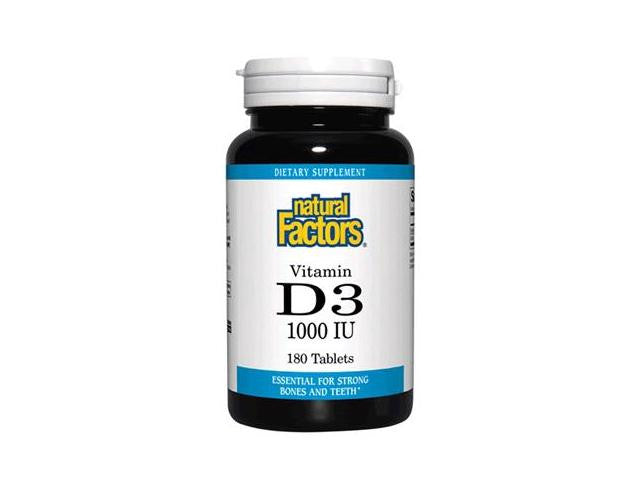
Natural Factors - Vitamin D3 Tablets
Feature summary
Each tablet delivers a single 25 mcg (1000 IU) dose of vitamin D3 so that sufficient levels can be maintained conveniently when dietary intake and exposure to the sun’s ultraviolet rays is low. When combined with an adequate calcium intake, each daily tablet will help prevent the brittle, weak bones of osteoporosis and support a healthy immune system. Vitamin D3 is also an important factor in reducing the risk of cognitive dysfunction.
Vitamin D3 1000 IU is available in both 90 and 180 tablet bottles and is suitable for vegetarians. It contains no artificial colours, preservatives, sweeteners, or common allergens, making it a safe product that can be recommended for the health of both mother and child during pregnancy and lactation. This product contains no GMOs and is a key factor in the maintenance of good health.
Main selling features
- Provides the natural D3 form of vitamin D (cholecalciferol)
- Softgels deliver vitamin D3 in a base of organic flaxseed oil, which enhances absorption due to the fat-soluble nature of vitamin D
- Available in tablets or softgels, each providing 1000 IU of vitamin D3
- Available in various bottle sizes, including an economical 500-softgel size
How it works
Vitamin D3 increases calcium absorption in the gut to sustain steady blood calcium and phosphate concentrations that enable normal bone mineralization. As a hormone, it regulates cellular production of important proteins and peptides.
Vitamin D3 helps increase the number of receptors on immune system cells to help them fight pathogenic bacteria and viruses. It helps white blood cells recognize foreign invaders and may also influence the release of protective proteins when there is an infection.
Vitamin D3 may benefit cognition by protecting neurons and supporting their development. Its receptors are found on many different tissues in the body, including those in muscles, the prostate, and the heart, indicating that vitamin D3 has more effects than we currently know.
Medicinal ingredients
| Each tablet contains: | |
| Vitamin D3 (cholecalciferol) | 25 mcg (1000 IU) |
Non-medicinal ingredients
